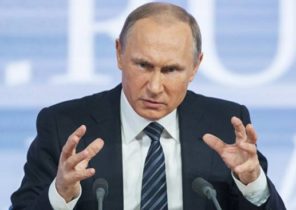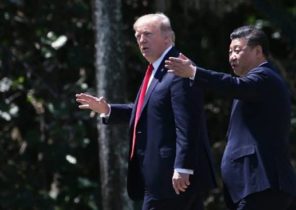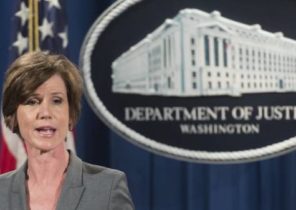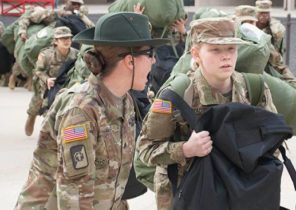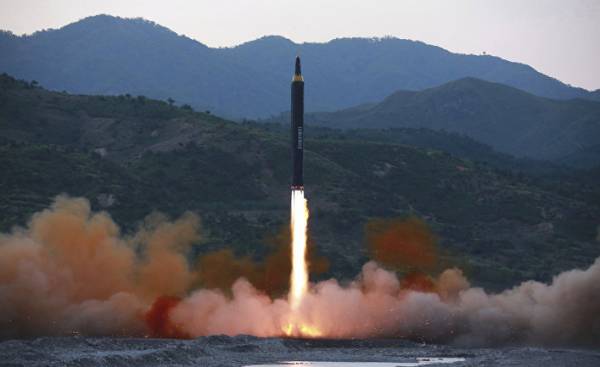
29 may North Korea conducted its third in the last three weeks, the launch of a ballistic missile, triggering a new wave of protests in South Korea and Japan. Tension is growing in the region since the beginning of the year, when the regime of Kim Jong-UN embarked on a series of tests, of which this is the ninth in a row.
The leaders of the countries “the Big seven” gathered at the recent meeting in Italy, unanimously recognized that deterrence of North Korea should be a top priority — this was stated by Prime Minister of Japan Shinzo Abe. However, given the militant seclusion of this country, a set of options is very limited.
In search of the best solution of this problem will try to explain the situation on the Korean Peninsula from the point of view of game theory.
Roll of the dice
Game theory is applicable to the analysis of conflict and cooperation in a competitive environment. According to her, the joint outcome is possible when the game is repeated indefinitely, players are few, and information about the game are known to all participants.
A positive result is achieved when the law of reciprocity; when in the case of foul play have the opportunity to retaliate as the game is repeated infinitely. In the presence of such alternatives and when the result is a collaboration, the players have no particular motives for fraud.
But if the game is played once or repeated a finite number of times, if it involves a large number of players and each of them has no idea about the strategy of the other, then each preferred outcome, “focused on him”. In this case, each player chooses the best solution individually, and not together. In the end, the end result for each is acceptable, but not perfect.
What is happening on the Korean Peninsula more resembles the latter scenario. To solve the issue of a nuclear missile program of the DPRK with a preemptive strike — not the easiest and hardly the best option, and the main players are likely to pursue their own interests.
The root of the problem is that North Korea has announced its intention to retaliate in case of any military action.
This can result in a humanitarian disaster, because the South Korean capital of Seoul is located only 60 kilometers from the border. Besides the main blow in this case can come to the us troops (numbering 28 500), based in South Korea.
Any counterattack from the North Korea will cause a retaliatory strike from the South and could lead to war on the Korean Peninsula. Or, if the U.S. and South Korea will not respond, will be for these countries, a serious humiliation. In any case, the exact location of North Korean missiles for the most part unknown.
A more effective way to limit the development of the North Korean nuclear program may be the tightening of existing economic sanctions and, if necessary, the introduction of new.
The key role belongs to China. It is the main trading partner of North Korea. China provides the country with oil, and the imports coal, whereby North Korea receives foreign currency. More than 90% of the oil consumed in North Korea are imported from China.
The dependence of North Korea from China has increased since then, as the United Nations in 2016, introduced in its relation to economic sanctions; Japan in 2006 ceased with the regime of trade relations, and South Korea followed the same example may 24, 2010.
Meanwhile, the strengthening of economic sanctions raised serious doubts, and he goes to such measures without much enthusiasm.
China torn by contradictions because he doesn’t want North Korea had nuclear weapons. Because then the country may present an immediate threat, and it will be for Japan and South Korea the pretext to develop its own nuclear weapons.
But, on the other hand, China does not want the collapse of the North Korean regime. The latter is fraught with the immigration crisis at the Chinese border, moreover, a United Korean Peninsula is likely to fall under US influence. Do not forget that North Korea also is China an ideal buffer to avoid with the United States direct confrontation.
Narrowing the range of possibilities
So far, the only winner in this game — Kim Jong-UN. In addition to the current tests of missiles, his regime in September 2016, have successfully completed the fifth in a row nuclear tests. The previous one was held in 2006, 2009, 2013 and January 2016. This situation illustrates one of the most tense moments in the strategic environment: the collision of individual and group interests.
To avoid war and to strengthen cooperation, China will have to share the responsibility for the diplomatic campaign aimed at finding a peaceful solution. Currently, he effectively provides North Korea undercover, allowing it to develop nuclear weapons.
In the face of escalating need for China along with the USA, South Korea, Japan, and the United Nations ensured a reliable and powerful deterrence of North Korea and prevented her further nuclear development.
However, for all participants, with the exception of North Korea, this option is becoming increasingly more difficult. Further achievements in the nuclear field, North Korea will be less reasons to refuse the development, and this in turn will limit the radius of action for another group of players.
Game theory tells us that individuals pursuing their own selfish goals, get their unscrupulousness bigger win. China may not want to lose the strategic partnership and economic benefits him trade with North Korea; under the new liberal President of South Korea may seek to preserve the policy of rapprochement pursued by former President Kim Dae Jung; and the United States can choose the easier path of using military force.
But it is important to remember that these results are for each of the players is not the most preferred. The best option is cooperation between all participants, including China. Coherent nonmilitary strategy, used together, is the most effective way to defuse tensions resulting from the development of North Korean missile and nuclear programs.


